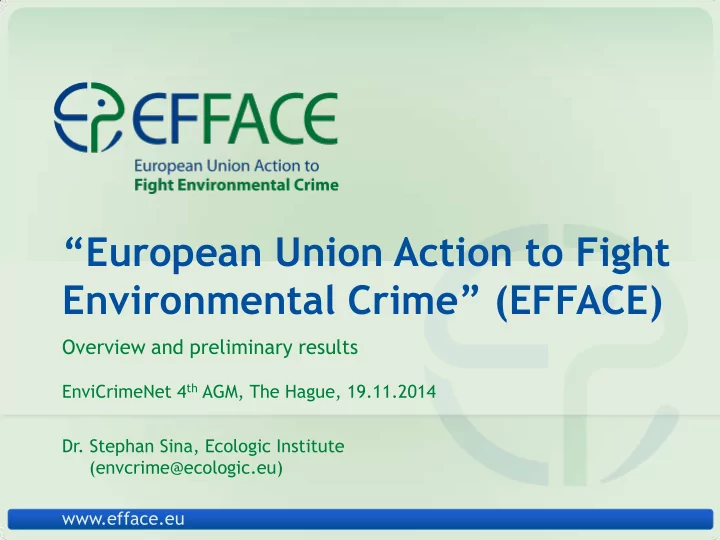

“European Union Action to Fight Environmental Crime” (EFFACE) Overview and preliminary results EnviCrimeNet 4 th AGM, The Hague, 19.11.2014 Dr. Stephan Sina, Ecologic Institute (envcrime@ecologic.eu) www.efface.eu
FP7 projects in general …. large and general rather than very specific, aimed at integrating insights from a variety of perspectives …. interdisciplinary …. with strong focus on policy impact at EU (and member state) level, dissemination and stakeholder involvement www.efface.eu
Basic facts on EFFACE December 2012 – March 2016 11 European partners (universities & think tanks) Involving lawyers, economists, political scientists, criminologists …. Funded in the EU‘s FP7, budget of around 2.8 Mio EUR Altogether about 200 person months, of which 170 on research www.efface.eu
Basic facts on EFFACE Overall aim: Develop policy recommendations aimed at EU (and its Member States) on how to better combat environmental crime > focus on efforts to combat environmental crime, rather than on details how envir. crime works No limitation to specific types of environmental crime or specific disciplines, but research focus on EU www.efface.eu
Components WP1: Analytical framework WP2: Instruments, actors and institutions WP3: Costs and impacts of environmental crime WP4: Case studies WP5: Interactive policy analysis (stakeholder involvement) WP6: SWOT analysis of EU efforts to combat envir. crime WP7: Options and policy recommendations Methods : Analysis of legal instruments, case studies, research interviews, data analysis, but no strong focus on generating „ new “ empirical data www.efface.eu
WP2: Instruments, actors and institutions Description and analysis of instruments, actors and institutions related to environmental crime on national, EU and international level 7 country case studies on France, Germany, Italy Poland, Spain, Sweden, UK Selected studies concerning EU and international level, including a report on networks and NGOs Strong legal focus (instruments), but also empirical analysis (actors and institutions, practical enforcement) including research interviews Due in January 2015 www.efface.eu
WP3: Costs and impacts of environmental crime Review of existing data sources Quantitative overview of the extent of damages caused by environmental crime Economic analysis of (monetised) costs of environmental crime Summary of available methodologies and tools for economic assessments Due in June 2015 www.efface.eu
WP4: Case studies 1. Illegal fisheries within the EU 2. Illegal waste shipment in East Asia 3. Local illegal pollution incidents within the EU 4. Effects of organized crime on air and soil pollution levels in Italy 5. Illegal logging and trade in illegal timber 6. Illegal wildlife trade in Norway and the UK suggestions for improvement within the EU. 7. Industrial spill accidents in Romania and Hungary 8. Corruption and environmental crime in Armenia 9. Smaller case studies on environmental impact of illegal drug production and the war on drugs & use of mercury in gold mining (Latin America) Due in March 2015 www.efface.eu
WP5: Stakeholder involvement Advisory Board 9 semi-public workshops to present results and get feedback from stakeholders Midterm/final conference Online „ Environmental Crime Research and Action Guide” www.efface.eu
WP 2: Preliminary results No final results at this stage, but some provisional findings from WP 2 (esp. aggregation of country reports) General problem: Data on enforcement of environmental criminal law are largely lacking/not collected in a coherent way www.efface.eu
Provisional results at national regulatory level Divergence in regulatory framework for environmental crimes (criminal code, environmental code, sectoral laws) Large convergence concerning substantive criminal law in general Divergence related to penalties (maximum penalties and complementary sanctions) Divergence concerning institutions (competences to monitor and investigate) No clear link between legislation on environmental crime and organised crime www.efface.eu
Provisional results at national enforcement level Tendency: low probability of detection, prosecution and sanctioning, and low level of penalties (but increased use of administrative fines) Lack of resources and funding for monitoring and investigating environmental crime (low political priority) Need of specialisation at all levels of the enforcement chain (administrative authorities, police, prosecutors, judges) www.efface.eu
Preliminary results: conclusions On national level lack of correlation between regulatory level and enforcement level: resources given to the latter do not correspond to the expansion of the former Importance of networking and information exchange as one means to improve enforcement activities Importance of better data collection www.efface.eu
The way forward Results of WP 2, 3 and 4 will feed in WP 6 (SWOT analysis) and WP 7 (options and policy recommendations) Further analysis in WP 6 and 7 will focus on: – Further harmonisation of substantive environmental criminal law at EU level (excluding sanctions) – System of sanctions (administrative vs. criminal vs. civil proceedings) – Functioning of enforcement institutions and cooperation between them – Data and information management – Role of NGOs, communities, victims, trust-based instruments – External dimension of environmental crime – what can EU do? – Use of environmental liability – Organised environmental crime www.efface.eu
How to stay tuned Take a look at our website (www.efface.eu) Read our policy briefs Register for our newsletter (3 – 4 times/year) at the website Follow us on twitter: Environmental Crime @EnvCrime www.efface.eu
How to contribute Participate in one of our public events (final conference) Invite us to your events Become a member of our international contact group (by invitation) Contribute to the online „Research and Action Guide“ …. Any other idea? Let us know about it! www.efface.eu
Recommend
More recommend